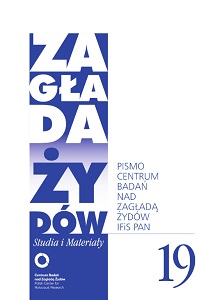Jak radio pamięta powstanie w getcie warszawskim? O rocznicach wybuchu buntu zbrojnego na podstawie publicystyki radiowej z lat 1945–1989
How does radio remember the Warsaw Ghetto Uprising? About the anniversaries of the outbreak of the armed rebellion on the materials of radio journalism from the years 1945-1989.
Author(s): Joanna Bachura-WojtasikSubject(s): Media studies, Communication studies, WW II and following years (1940 - 1949), Post-War period (1950 - 1989), History of the Holocaust
Published by: Stowarzyszenie Centrum Badań nad Zagładą Żydów & IFiS PAN
Keywords: Warsaw Ghetto Uprising; radio reports; radio documentary programs; memory studies;
Summary/Abstract: In this article, the author undertakes a descriptive analysis of the journalistic broadcasts on Polish Radio over the years. These are radio materials dealing with the anniversaries of the outbreak of the Warsaw Ghetto Uprising in April 1943. She has taken the years 1945–1989 as the temporal caesura. The author is interested in how the anniversaries were communicated each year, the narrative of the broadcasts and the issues addressed in them. In the research, the method of quantitative-qualitative analysis of the content of radio broadcasts was used. In this manner, it was possible to grasp the dynamics of the anniversary broadcasts, how the subject was raised or muted; to isolate the radio genres in which the topic appeared; and to look at how the issue was framed and shaped the Polish Holocaust discourse at the time. The research is consonant with the memory studies. Immediately after the war, as well as in the 1950s, an apologetic image of Poles was shaped, which exploded with an even greater force in the propaganda narrative of the 1960s with an exaggerated emphasis on Polish assistance to their Jewish brethren as a common attitude during the German occupation. The Polish combatants have become synonymous with the national struggle, and elements of Polonization can be seen in the exposition of the theme of their alleged assistance to the struggling ghetto. In the 1980s, journalists and radio reporters returned to the issue of the Holocaust and the ghetto uprising, however on the whole, the collective image of Poles remained intact. It was only in the early days of Poland’s political transformation heralded an opening to the issues of Polish-Jewish relations, including a reworking of the difficult history. Was it successful? That remains a matter of debate to this day. It is hard not to get the impression that the narrative of radio reports of 1945–1989 was downright hostile to anything that deviated from the designed thinking about oneself and the nation. One may ask: “Was it necessary to mount an attack to defend ‘Polish sensibility’”?
Journal: Zagłada Żydów. Studia i Materiały
- Issue Year: 2023
- Issue No: 19
- Page Range: 185-207
- Page Count: 23
- Language: Polish

